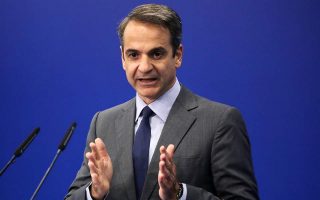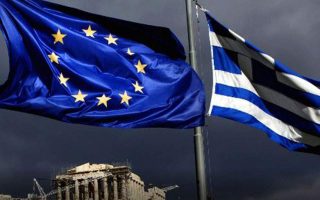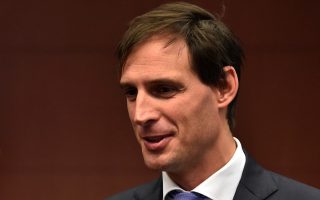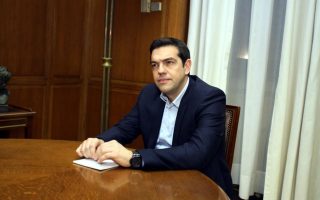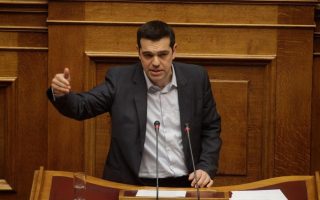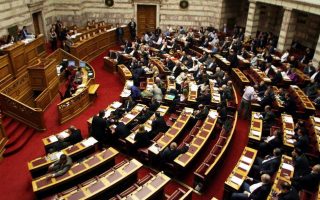Mitsotakis on EU budget: ‘We cannot be expected to do more with less’
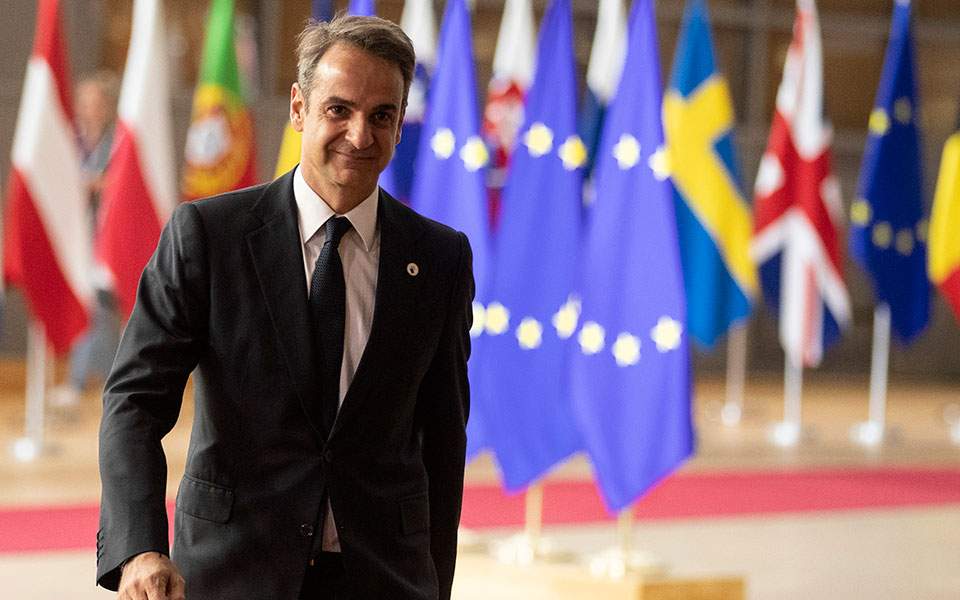
European Union leaders start two days of tough talks on Thursday on a joint seven-year budget from 2021 and must work out how to fill a 75 billion euro ($81 billion) hole left by Britain's departure just as they face costly climate, migration and development challenges.
CZECH PRIME MINISTER ANDREJ BABIS
"I don't think so (that there would be a deal now). The positions are so different that I don't expect it."
ITALIAN PRIME MINISTER GIUSEPPE CONTE
"We expect a complicated negotiation. We have to be very ambitious."
"We have to be ambitious on own resources."
"We don't like rebates."
SPANISH PRIME MINISTER PEDRO SANCHEZ
"The (budget) proposal… is highly disappointing…worse not only for the EU as a whole but also for Spain."
"It reduces in a significant way policies that are fundamental for Spain such as policies of cohesion, policies related to peace and related to the common agriculture policy."
"It doesn't solve an important issue for us which is the EU's own revenues."
"There is still much to do."
"We are starting a negotiation that will be very complex that seems will be long not only today but over the coming days and weeks."
FRENCH PRESIDENT EMMANUEL MACRON
"It would be unacceptable to have a Europe that compensates for the departure of the British by reducing its own means."
"You can't say one moment that we must be more ambitious and then, the day when you need to put money down to meet those ambitions, say: 'We're not there.'"
"The discussions can't be successful by insisting on a budget of 1%."
"I will take the time needed to reach an ambitious agreement."
"I think there is a way to find an agreement during this summit if everybody adopts a spirit of compromise and ambition. This could take several hours, several nights, several days. I'm ready."
DUTCH PRIME MINISTER MARK RUTTE
"A third (of the budget) is still for agriculture, a third for cohesion. The Netherlands has been affected by Brexit. With Germany and Sweden, the Netherlands has been hit more than other countries by the migration crisis of a few years ago."
"I cannot sign up to this proposal. The proposal is simply not good. I talked today with the other net contributors… We know we pay more than others, we are a rich country, we agree that we are trying to get others to our level, but there is a limit."
"The easiest way to our position is to keep it at 1.0% of European income, with the rebate… Unless you lower that level to 0.6 or 0.7%, then we could do without a rebate."
"I think it's easier to form a Belgian government than to sort out a budget for Europe."
GERMAN CHANCELLOR ANGELA MERKEL
"Germany comes here with great determination to find a solution. We cannot say now whether we will succeed, but I hope that we make sizeable progress… It's a complicated task and certainly big differences have to be overcome."
"Germany is not content with the current state of negotiations because we believe that among the net contributors the right balance has not been struck."
"It is clear that for the convergence and agriculture in European Union it will mean more money from the German side… but this must be shared fairly among the net contributors."
"We have particular interest that our new (eastern) states continue to receive help… we want a modern agenda… but also the new themes like migration, external border protection, development aid are important."
LUXEMBOURG PRIME MINISTER XAVIER BETTEL
"We don't need another summit in March, we just need to conclude. I think we will be able to conclude. I hope so."
"The proposal on the table is that we are going to do more with less. Less persons, less money."
EUROPEAN COMMISSION PRESIDENT URSULA VON DER LEYEN
"It's going to be a long and tough negotiation."
"The European Green Deal and making Europe fit for digital age – for us it's important that at least 25% of funds will be spent on projects under the Green Deal."
"It's very important that there is a proposal for own new resources."
"As the budget is rather tight, own new resources for the EU would mitigate the pressure while paying into the ecological and digital transition."
"For me it's important to defend a modern budget with new priorities."
"The proposal we have is a good starting point."
SWEDISH PRIME MINISTER STEFAN LOFVEN
"We are fine being net payers… but we absolutely cannot accept a dramatic increase in our fees. That is not doable at all."
"It is very clear that the member states are far apart from one another. The president of the European Council put forward a proposal that is far from enough."
"Now we have a strong cooperation between the like-minded countries, Denmark, Austria, the Netherlands and Sweden working very close together making sure that the volume of the budget will stay at 1.0%, and also that we will have sustainable and good rebate mechanism."
AUSTRIAN CHANCELLOR SEBASTIAN KURZ
"It is in the stars whether we will have an agreement."
"We will have a coordinated approach with Denmark, Sweden and the Netherlands."
"In the group of net contributors we agreed to act together and to only approve this budget together in the end."
"Our contribution must not grow endlessly. We represent the interests of our tax payers here. Our second goal is for the money to be mainly spent on investments into the future like research, innovation and development as well as border security."
"There must be conditionality, the necessity especially for the net receivers to respect the rule of law, democracy, the freedom of opinion and the freedom of the media."
LITHUANIAN PRESIDENT GITANAS NAUSEDA
"I slept well so… and am prepared for a long night spent here."
"The interest of our country is to have sufficient funding on cohesion."
"We will be very consistent on convergence of direct payments to farmers."
EUROPEAN COUNCIL PRESIDENT CHARLES MICHEL
"There are many interests, there are many concerns. They are all legitimate but I'm convinced it's possible to make progress in the next hours and the next days. Everything is on the table to be able to decide."
ESTONIAN PRESIDENT JURI RATAS
"I think these negotiations today and tomorrow, an maybe over the weekend, will be very difficult."
"We have two priorities – direct payments to support our farmers and Via Baltica."
POLISH PRIME MINISTER MATEUSZ MORAWIECKI
"The talks are also difficult because some countries are pushing for new spending goals, they want the budget to have a different structure and at the same time they want to cut spending on cohesion policy and agriculture."
"From our perspective, there can be no agreement to both change the structure of the budget and to reduce its size."
"New areas of spending, like research or migration, defence or innovation are important policy areas, but they cannot be at the expense of cohesion and the common agriculture policy."
GREEK PRIME MINISTER KYRIAKOS MITSOTAKIS
"We cannot be expected to do more with less. We need a bigger envelope if we want to support at the same time traditional policies like cohesion and the common agricultural policy."
"I expect a complicated and difficult discussion."
"If we want to be very ambitious, we will need more resources."
LATVIA PRIME MINISTER KRISJANIS KARINS
"We'd all be pleased if we could come to an agreement during this session."
"To reach ambition, we also need to invest funds."
"Do we want this ambitious policies in Europe, or not. If we want, we need to invest. If we don't want to invest, we must revisit these ambitions."
"I'm interested in us coming to a deal, I think we need that especially with Great Britain leaving, it's a clear signal we need to give to our citizens that Europe is alive and well and we can continue to function."
FINLAND PRIME MINISTER SANNA MARIN
"Member states are still quite far away from each other. We'll see if we can finish this week or we'll have to continue later on."
"There is a lot of ambition to this budget. But let's be realistic – Britain has left the EU and we are in a new position.
"Finland is against rebates. Finland is against corrections."
"The proposal has gone in the wrong direction. Finland thinks the overall level is a bit too high, we would like to have it more moderate."
"I am very disappointed that the rule of law mechanism… has been watered down. So we want it to be more strong."
TOP EU DIPLOMAT JOSEP BORRELL
"The proposals are never enough because some policies require a lot of resources, let me talk about my specific field – security and defence."
"If you want to be a player you have a to pay a price."
[Reuters]
